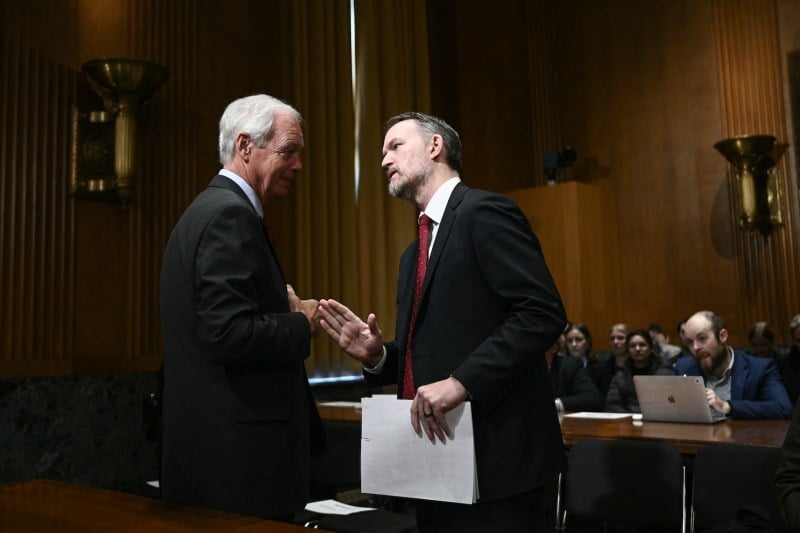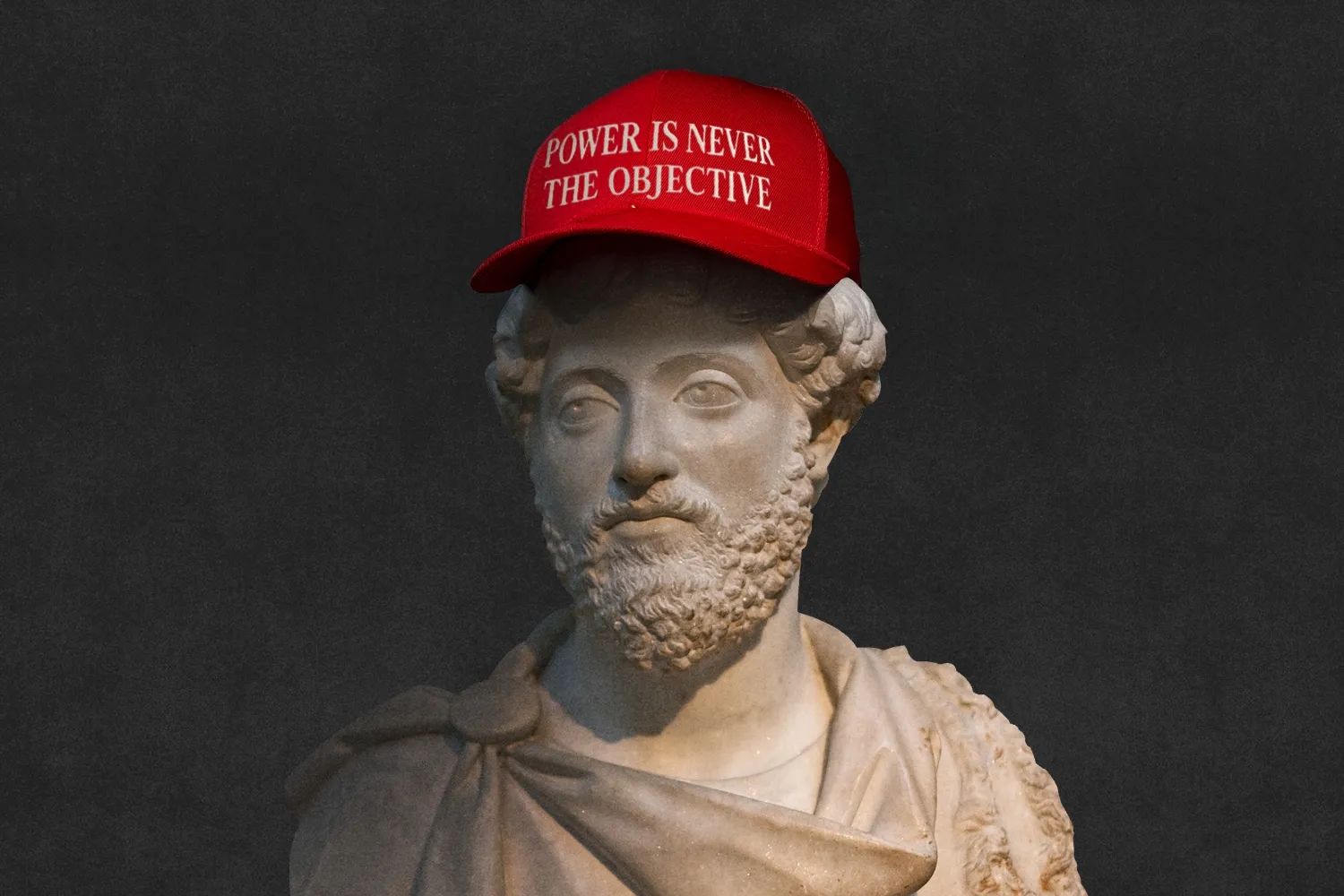Congress Is Still Trying to Wrest Back Trade Authority From Trump

Congress Is Still Trying to Wrest Back Trade Authority From Trump
But it will likely take far more economic damage to reverse decades of trade delegation.
U.S. Trade Representative Jamieson Greer speaks to Sen. Ron Johnson, a Republican from Wisconsin, before the start of a Senate Finance Committee hearing on President Donald Trump’s trade policies, seen on Capitol Hill in Washington, D.C., on April 8. Brendan Smialowski / AFP via Getty Images
Some U.S. lawmakers remain determined to claw back some of the constitutional trade authority that Congress began handing the president 90 years ago, introducing a spate of bills and resolutions in both houses in an effort to curb U.S. President Donald Trump’s ability to single-handedly upend the U.S. and global economies.
Several Republican senators have joined their Democratic colleagues to try to restore some of the congressional authority over tariffs that is enshrined in the Constitution.
Some U.S. lawmakers remain determined to claw back some of the constitutional trade authority that Congress began handing the president 90 years ago, introducing a spate of bills and resolutions in both houses in an effort to curb U.S. President Donald Trump’s ability to single-handedly upend the U.S. and global economies.
Several Republican senators have joined their Democratic colleagues to try to restore some of the congressional authority over tariffs that is enshrined in the Constitution.
“So the good news is that our colleagues are waking up to the fact that the president went too far and that we need to have a discussion,” said Democratic Sen. Maria Cantwell, who has seven Republican co-sponsors on her bill—introduced with Sen. Chuck Grassley—to allow Congress to review any tariff actions taken by the executive branch.
However, House Republicans are not breaking ranks with the White House, and the flurry of lower-chamber bills and resolutions meant to curb Trump’s tariffs has been stymied by Republican procedural gimmicks.
Since Trump, after taking office a second time, has ratcheted up his trade wars, there has been a bevy of congressional efforts targeting the national emergency that Trump invoked to levy tariffs on Canada, Mexico, and China; the national emergency he cited to put tariffs on nearly the whole world; his expansive use of national-security justifications to shield U.S. steel and aluminum producers; and even presidential authority to set tariffs at all.
“Donald Trump’s aimless, chaotic tariff spree has proven beyond a doubt that Congress has given far too much of its constitutional power over international trade to the executive branch,” said Sen. Ron Wyden, the ranking member of the Senate Finance Committee, in a hearing with Trump’s trade representative, Jamieson Greer, on Tuesday. “It is time to take that power back,” Wyden added.
Wyden has released a resolution that would terminate the national security emergency that Trump declared to justify the global tariffs, and the senator has redoubled his desire to rein in Trump even after the administration’s change of heart on Wednesday.
One reason why Congress remains concerned despite Trump’s seeming walk-back on Wednesday from the most severe of his tariff plans, leaving just the highest duty rates in more than a century, is that markets remain deeply gloomy. U.S. stock and bond markets were back in the doldrums on Thursday, and crude oil, fearing a broad economic slowdown, is again plunging. Many congressional questions fired at Greer over two days of testimony centered on the economic pain— especially in retirement accounts—suffered by ordinary Americans, in addition to rising costs for households.
Even if continued market and economic turmoil does change the calculus enough in the House to secure a floor vote or passage of any of the tariff-related bills and resolutions, overcoming the nearly inevitable presidential veto will be a lot harder—unless the economic damage from Trump’s trade wars becomes more apparent in months to come. As part of the Wednesday “pause,” Trump raised tariff rates on China to stratospheric levels, forcing a decoupling of the world’s largest and second-largest economies that will, if continued, have ripple effects around the globe.
The whole reason that Trump’s effort to top the notorious Smoot-Hawley tariffs of the early 1930s is spurring Congress into action is because it was the corrupt, log-rolling nature of congressional deliberation behind that snowballing tariff omnibus that drove lawmakers to hand the trade keys to the White House in the first place. Bypassing Congress, it was argued at the time, would avoid narrow sectoral interests and allow for a deliberative tariff and trade policy taken in the national interest.
The first big congressional delegation of its trade powers came in 1934. Three more major transfers of trade authority followed, in 1962, 1974, and 1977, along with plenty of minor delegations of trade oversight. Trump has especially leaned on the last three trade acts to justify his first- and second-term tariffs on steel, cars, Canada, Mexico, China, and everyone else. The 1977 International Economic Powers Act (IEEPA) has become a particular go-to for this Trump administration, though tariffs had never been levied under the Carter-era legislation before this year.
That reliance on a questionable “national emergency”—which is driving many of the narrower congressional bills and resolutions—is also leading to challenges in court. As a rule, though IEEPA’s use as a lever for tariffs is novel, courts in the past have given the executive wide deference on national security matters and IEEPA invocations, though government arguments in court will get more challenging now that Trump has decided that the national emergency was not so bad that he couldn’t suspend it for three months on a whim.
At any rate, the reason that some in Congress are intensifying the timid efforts made during the first Trump term to wrest back their authority over trade is because in a few short weeks, Trump 2.0 has shown himself to be much more unbridled and destructive than even during his first term.
The ad hoc nature of the administration’s policymaking on trade—from the risible formulation of the so-called reciprocal tariffs to the sudden and unforeseen reversal of that policy in the middle of testimony by the U.S. trade representative—has convinced many that delegating trade authority to this particular president may be a dangerous dereliction of duty.
“Do you think Congress should be left out?” Sen. Bernie Sanders asked Greer during Tuesday’s testimony. “Do you have any concerns about all that power in the hands of the president?”
This post is part of FP’s ongoing coverage of the Trump administration. Follow along here.
Keith Johnson is a reporter at Foreign Policy covering geoeconomics and energy. X: @KFJ_FP
More from Foreign Policy
-

American flags are draped around tables and pipes in a small factory room as women work at sewing machines to produce them. Tariffs Can Actually Work—if Only Trump Understood How
Smart trade policy could help restore jobs, but the president’s carpet-bomb approach portends disaster.
-

Donald Trump looks up as he sits beside China’s President Xi Jinping during a tour of the Forbidden City in Beijing on Nov. 8, 2017. Asia Is Getting Dangerously Unbalanced
The Trump administration continues to create headlines, but the real story may be elsewhere.
-

Trump announces tariffs Trump’s Wanton Tariffs Will Shatter the World Economy
Economic warfare is also a test for U.S. democracy.
-

The Department of Education building in Washington, DC on March 24. Why Republicans Hate the Education Department
Broad popular support means that even Ronald Reagan failed at dismantling the agency.











Join the Conversation
Commenting on this and other recent articles is just one benefit of a Foreign Policy subscription.
Already a subscriber?
.
Subscribe
Subscribe
View Comments
Join the Conversation
Join the conversation on this and other recent Foreign Policy articles when you subscribe now.
Subscribe
Subscribe
Not your account?
View Comments
Join the Conversation
Please follow our comment guidelines, stay on topic, and be civil, courteous, and respectful of others’ beliefs.
Change your username |
Log out
Change your username:
CANCEL
Confirm your username to get started.
The default username below has been generated using the first name and last initial on your FP subscriber account. Usernames may be updated at any time and must not contain inappropriate or offensive language.